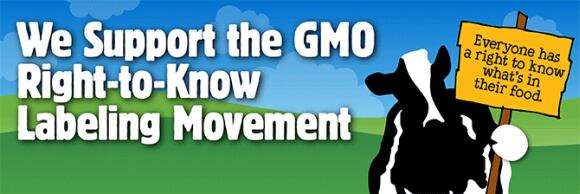Speaking to FoodNavigator-USA after Peter DeFazio (D-OR) held a press conference with other lawmakers and GMO labeling supporters in Washington DC this morning, a Center for Food Safety spokeswoman said: “The Genetically Engineered Food Right To Know Act HR1699 / S.809 [which was introduced to Congress last April but has made little headway since] is still picking up co-sponsors, but the purpose of the press conference was to put pressure on President Obama.
“We are still pushing the bill but Congress doesn’t need to pass this bill for the FDA to take action on GMO labeling.”
Stonyfield Farms president: This is not an effort to stop GMOs, nor to mark them with a skull and crossbones
In a letter signed by 200 groups including Stonyfield Farm, Ben & Jerry's, Amy’s Kitchen, Annie’s, organic farming groups and various activist groups, President Obama was reminded of a pledge he made on the campaign trail in 2007 to “let folks know whether their food has been genetically modified because Americans should know what they are buying”.
(The video below from Food Democracy Now has the 'pledge' 27 seconds in.)
The letter added: “In 2007, you pledged to give consumers the right to know if their food is genetically engineered. National polls show that 93% of Americans share your view.
“While we will continue to support state-level labeling efforts, we believe there should be a mandatory national labeling system.”
Gary Hirshberg, chairman and cofounder of organic yogurt maker Stonyfield Farm, added: “This is not an effort to stop GMOs, nor to mark them with a skull and crossbones - it is simply an exercise of our rights as citizens to know what we are buying and to be able to choose the ways that our foods are grown.”
In an apparent reference to a proposal currently being floated by the GMA calling for the FDA to set up a system for the voluntary labeling of the absence or presence of GMOs (click here), they added: “Allowing responsible companies to voluntarily disclose the presence of GE ingredients is simply not enough.”
DeFazio said: "This is about consumer rights. People should have the ability to make an informed choice about what they feed their family and we know it’s not an impossible request of food manufacturers, because they already label GMOs in more than sixty countries."
The Genetically Engineered Food Right To Know Act

HR1699 - which has 50 co-sponsors - requires that “genetically engineered food and foods that contain genetically engineered ingredients be labeled accordingly” - and is mirrored by Senate Bill S809 (which has 15 cosponsors). It does not apply to foods sold in restaurants, foods made with GM processing aids, or medical foods.
In a Dec 24 update on its website, Ben & Jerry's said it was making good progress on its initiative to phase out GMOs from its products, adding: "We have approved and sourced more than 85% the 110 ingredients that we’re transitioning to Fairtrade certified and Non-GMO sourced.” The aim is to get to 100% by summer 2014.
However, it added that it would take longer to switch to sourcing milk from cows that were not fed GMOs given the ubiquity of GM corn and soy in US animal feed.
The current legal position
Currently, federal law does not require the labeling of genetically engineered foods as the FDA has consistently argued that they do not differ from other foods "in any meaningful or material way" or present any different or greater safety concerns than foods developed by traditional plant breeding methods.
Many large food companies, meanwhile, oppose mandatory labeling because they believe it would reinforce an erroneous perception that there is something wrong with GM crops.
They also argue that if the tide turns against agricultural biotechnology, it won’t be a victory for consumers - that there is no evidence that the global food supply would be safer or more sustainable without genetically engineered crops (as a recent report from GMO Inside alleged).
However, supporters of GMO labeling argue that consumers have a right to know what they are eating.
Click here for all the latest news on GMO labeling.
